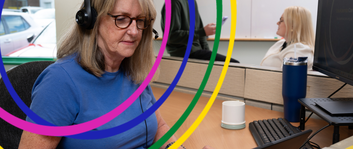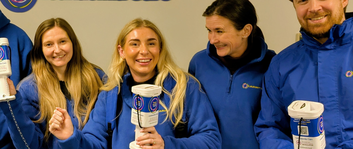Aggressive NK cell leukaemia (ANKL)
Aggressive natural killer cell leukaemia (ANKL) is a rare, fast growing blood cancer. Find out what it is, signs and symptoms it can cause, how it’s diagnosed and common treatment options.
Summary
- ANKL is a very rare, fast-growing blood cancer. It affects white blood cells called natural killer (NK) cells.
- We do not know the exact cause of ANKL but it is not because of anything you have or haven’t done.
- Symptoms include fever, night sweats, losing weight without trying to, swollen lymph nodes, or tummy pain or discomfort.
- ANKL is diagnosed using blood tests and sometimes bone marrow tests.
- Treatment options include chemotherapy, radiotherapy, stem cell transplants and clinical trials.
- Your haematology team will let you know what treatment they recommend, how you will have it, and what you can expect.
- You will also have medicines to prevent or treat symptoms or side effects.
What is ANKL?
Aggressive natural killer cell leukaemia (ANKL) is a fast-growing blood cancer. It starts in white blood cells called natural killer (NK) cells. NK cells are part of your immune system. They usually help destroy cells that have become infected by a virus. But if you have ANKL, they become abnormal and divide uncontrollably. The abnormal cells build up in your lymph nodes, liver, spleen and bloodstream.
Who gets ANKL?
ANKL is a very rare leukaemia. This is why you might not have heard of ANKL before. It can affect people of any age, but it is more common in people between 30 and 50.
What causes ANKL?
We do not know the exact cause of ANKL. People with ANKL have genetic changes in their leukaemia cells that stop the cells from working properly. However, we do not know exactly why these genetic changes happen. It is not because of anything you have or have not done.
Having an infection called Epstein Barr virus (EBV) can increase your chance of getting ANKL. But most people who’ve had EBV do not get ANKL. ANKL itself is not infectious. You cannot catch it and you cannot pass it on to someone else.
More about the link between Epstein Barr virus and ANKL
EBV is a viral infection. More than 9 in every 10 people in the UK have had it, but you might not have noticed. Sometimes EBV infection can cause glandular fever, but you may not get symptoms.
After you’ve been infected with EBV, it stays in your body. It is normally kept under control by your immune system. But sometimes EBV can activate your immune system to make more NK cells. This increases the chance of NK cells becoming abnormal, leading to ANKL. Around 9 in every 10 people with ANKL have had EBV. But most people who have had EBV never get ANKL.
Symptoms of ANKL
The signs and symptoms of ANKL vary from person to person. Some of them can be serious or life threatening.
ANKL can cause the following signs and symptoms:
- Fever
- Night sweats
- Losing weight without trying to
- Tummy pain, bloating or discomfort due to a swollen spleen or liver
- Swollen lymph nodes
- Serious bleeding or clotting problems
- Yellowing of your skin or the whites of your eyes (this may look different on black or brown skin)
- Infections that last a long time or keep coming back
- Feeling tired, breathless or dizzy due to a low red blood cell count (anaemia)
- Bruising or bleeding easily (for example, nose bleeds or bleeding gums when you brush your teeth)
How is ANKL diagnosed?
You’ll have blood tests and sometimes bone marrow tests to diagnose ANKL. The samples go to the lab for specialist testing.
Blood tests
You will have blood tests to:
- Measure your numbers of red blood cells, white blood cells and platelets. If you have ANKL, you’ll have high levels of abnormal NK cells. You may have low levels of healthy blood cells.
- See how your blood cells look under a microscope. ANKL cells are larger than healthy NK cells, irregular in shape and contain lots of granules.
You might also have blood tests to:
- Check how well your liver and kidneys are working.
- Measure the amount of Epstein Barr virus (EBV) DNA in your blood. Your team may also measure this to check your response to treatment.
Bone marrow tests
You might have a bone marrow test to confirm the diagnosis, but this may not be needed. This involves taking a sample of your bone marrow, usually from the back of your pelvis, with a local anaesthetic.
Lab tests
Your doctor will send your blood and bone marrow samples to the lab for specialist tests. They may check what proteins are on the surface of your leukaemia cells, or what genetic changes they have.
Other tests you might have
You might have a PET-CT scan or MRI scan to check if your ANKL has spread outside your bone marrow. Depending on your symptoms, you might have other tests or scans.
How is ANKL treated?
Because it is so rare, it is difficult for researchers to carry out trials to work out the best treatment for people with ANKL. So, at the moment, there are no definite treatment guidelines and different doctors might use different approaches.
Your haematology team will explain what treatment they recommend and what you can expect from it. They will base this on many factors, including:
- Your symptoms and test results
- Your age and overall fitness
- Whether or not you have any other medical conditions
- Your preference on how you wish to be treated
There are a number of treatment options your haematology team might consider. These might include:
Chemotherapy
Chemotherapy medicines kill cells that are dividing rapidly, such as blood cells. You’ll probably have a combination of chemotherapy medicines, including one called L-asparaginase. If your doctor suggests chemotherapy, they will tell you exactly what medicines they suggest and how you have them.
Treatment as part of a clinical trial
A clinical trial could let you access treatments that would not be available otherwise. If there is a trial suitable for you, your team should explain what it involves and the risks and benefits of it. It is your choice whether or not to take part.
A stem cell transplant
If you respond well to your first treatment, your team might recommend a stem cell transplant. This aims to stop ANKL coming back. A stem cell transplant is very intensive and is only suitable for people who are fit enough to have it. If it’s an option for you, your team will discuss it with you.
Supportive treatment
You will also have medicine to prevent or treat symptoms or side effects and to manage serious complications. This is called supportive treatment. It does not treat your ANKL itself, but helps you feel better.
Supportive treatment might include:
- Steroids, which can help with many different symptoms
- Transfusions of platelets or proteins to help your blood clot (clotting factors), if you need them
- Blood transfusions or medicines called growth factors, if your blood counts are low
- Medicine to prevent or treat infections
- Medicine to prevent or treat side effects
Your haematology team will let you know what treatment they recommend, how you will have it, and what you can expect.
Outcomes of ANKL
ANKL is an aggressive type of cancer. It can be very difficult to treat.
As with most cancers, outcomes vary from person to person. They depend on lots of different factors, including:
- Your age and overall fitness
- Your test results
- Any other health conditions you have
- How well you respond to your first treatment
Your consultant is the best person to advise you on your outlook. They can take account of your individual circumstances and test results.
Sources we used to develop this information
El Hussein S, Medeiros LJ, Khoury JD. Aggressive NK cell leukemia: current state of the art. Cancers. 2020 Oct 9;12(10):2900.
Fox CP, Ahearne MJ, Pettengell R, Dearden CE, El-Sharkawi D, Kassam S, Cook L, Cwynarski K, Illidge T, Collins G. Guidelines for the management of mature T-and natural killer-cell lymphomas (excluding cutaneous T-cell lymphoma): a British Society for Haematology Guideline. British Journal of Haematology. 2022 Feb;196(3):507-22.
Huang L, Liu D, Wang N, Ling S, Tang Y, Wu J, Hao L, Luo H, Hu X, Sheng L, Zhu L. Integrated genomic analysis identifies deregulated JAK/STAT-MYC-biosynthesis axis in aggressive NK-cell leukemia. Cell Research. 2018 Feb;28(2):172-86.
Ishida F. Aggressive NK-cell leukemia. Frontiers in Pediatrics. 2018 Oct 10;6:292.
Kuri A, Jacobs BM, Vickaryous N, Pakpoor J, Middeldorp J, Giovannoni G, Dobson R. Epidemiology of Epstein-Barr virus infection and infectious mononucleosis in the United Kingdom. BMC Public Health. 2020 Dec;20:1-9.
Ni Y, Li L, Wang Y, Sun L. Clinicopathological features and treatment of aggressive natural killer cell leukemia: case series and literature review. The Turkish Journal of Pediatrics. 2024 Oct 7;66(4):481-9.
Roderburg C, Krieg S, Krieg A, Luedde T, Kostev K, Loosen SH. The association between infectious mononucleosis and cancer: a cohort study of 24,190 outpatients in Germany. Cancers. 2022 Nov 26;14(23):5837.
Sumbly V, Vest M, Landry I. Aggressive natural killer cell leukemia: a brief overview of its genomic landscape, histological features, and current management. Cureus. 2022 Feb 23;14(2).
Need support?
You are not alone. We're here for you whether you have a diagnosis yourself or know someone who has. If you'd like advice, support, or a listening ear, call our freephone helpline on 08088 010 444 or send a WhatsApp message to 07500 068 065.
Help us improve our information
We aim to provide information that’s reliable, up-to-date, and covers what matters to you. Please complete our short survey to help us improve our information and make sure it meets your needs.
About our information
This information is aimed at people in the UK. We do our best to make sure it is accurate and up to date but it should not replace advice from your health professional. Find out more about our information.
Page last reviewed: 31 August 2025
Updated January 2026
Next review due: 31 August 2028
Need help understanding this information?
Our support team is here to answer your questions and provide guidance.
Contact Support


